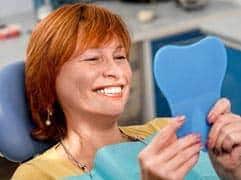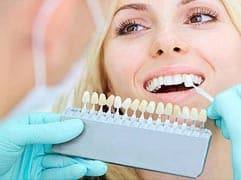Oral Health Care and Prevention
Dentistry Built on Relationships, Honesty, and Trust
Preventative Dental Program Options
Both natural teeth and teeth with restorations survive best in an oral environment that is clean and where the intake of harmful foods is controlled.
Our program is designed to help prevent new cavities, preserve teeth that have been restored and manage periodontal disease.
At the initial visit, oral hygiene instructions are reviewed and are reinforced at subsequent recall visits. The following are helpful recommendations:
- Brush your teeth twice a day in a circular motion with a soft bristled toothbrush aimed at the gum
- Floss every night in an up and down motion while keeping the floss in a U-shape and against the tooth surface
- Avoid smoking
- Avoid sticky sugary foods
- Eat a balanced diet
- Use antiseptic and fluoride rinses as directed
- Sealants placed on young permanent teeth
We pride ourselves on our Preventative Dental Program. Contact us today at (515) 277-6358.

How to Brush Your Teeth!
- Place your toothbrush at a 45-degree angle to the gums.
- Gently move the brush back and forth in short (tooth-wide) strokes.
- Brush the outer surfaces, the inner surfaces, and the chewing surfaces of the teeth.
- To clean the inside surfaces of the front teeth, tilt the brush vertically and make several up-and-down strokes.
Tooth Brushing
Proper brushing is essential for cleaning teeth and gums effectively. Use a toothbrush with soft, nylon, round-ended bristles that will not scratch and irritate teeth or damage gums.
Gently brush the outer tooth surfaces of 2-3 teeth using a vibrating back & forth rolling motion. Move brush to the next group of 2-3 teeth and repeat.
Maintain a 45-degree angle with bristles contacting the tooth surface and gumline. Gently brush using back, forth, and rolling motion along all of the inner tooth surfaces.
Tilt brush vertically behind the front teeth. Make several up & down strokes using the front half of the brush.
Place the brush against the biting surface of the teeth & use a gentle back & forth scrubbing motion. Brush the tongue from back to front to remove odor-producing bacteria.
Remember to replace your toothbrush every three to four months. Researchers have established that thousands of microbes grow on toothbrush bristles and handles. Most are harmless, but others can cause cold and flu viruses, the herpes virus that causes cold sores, and bacteria that can cause periodontal infections.
Flossing
Flossing is a very important daily step in maintaining good oral hygiene. Dental floss is a thin string that can be waxed, unwaxed, plain or flavored. The technique can be awkward to do at first, but with practice, flossing will become easier and together with brushing, should be a part of ones daily routine.
The proper technique used in flossing is to wrap the floss between the thumb and forefinger of both hands and beginning with the molars, wrap the floss around each tooth, working it up and down several times on each side of the tooth. This motion will remove food particles and more importantly, it will remove the plaque that builds up. Flossing may cause some minor bleeding at first but after a few times, the bleeding should stop. Flossing should be done at least once a day, in order to keep your teeth and gums healthy.
Fluoride Treatments
Why Is Fluoride Important To Teeth?
Fluoride is absorbed into structures, such as bones and teeth, making them stronger and more resistant to fractures and decay. A process in your body called "remineralization" uses fluoride to repair damage caused by decay.
How Do I Get Fluoride?
Just drinking public water will provide a certain measure of fluoride protection. But for years, health professionals have endorsed the practice of supplementing our intake with certain dietary products, and topical fluorides in many toothpastes and some kinds of rinses. Certain beverages such as tea and soda may also contain fluoride. Certain kinds of dental varnishes and gels may also be applied directly to teeth to boost fluoride intake.
Fluoride at Your Dental Office
At each of your dental visits, until the age of 18, your dentist or hygienist will apply a fluoride treatment to your teeth. This concentrated fluoride should remain on your teeth for one minute and should not be rinsed away for at least a half an hour. This fluoride will strengthen the enamel and make your teeth more resistant to decay.
Dental Sealants
What are Dental Sealants?
Dental sealants are thin plastic coatings that protect the chewing surfaces of children's back teeth from decay (cavities). Because they have small pits and grooves, these surfaces are rough and uneven. Food and germs can get stuck in the pits and grooves and stay there for a long time because toothbrush bristles cannot brush them away. Sealants fill in the grooves and keep the food out.
Why are They Needed?
Children should get sealants on their permanent molars as soon as they come in--before decay attacks the teeth. Sealants, daily brushing and flossing, drinking fluoridated water, and regular dental check-ups are an important part of your child's oral health and the best defense against tooth decay.
Actual Patient Reviews
We have so many terrific reviews it's impossible for us to list them all! Thanks for supporting Iowa Dental Group with your gratitude.
Dental Office Location
Iowa Dental Group prides ourselves in offering the highest quality dentistry at a fair and reasonable fee.
Des Moines, Ia 50311
(515) 277-6358
iowadentalgroup@hotmail.com
https://www.iowadentalgroup.com
Iowa Dental Group Contact Form
Our Des Moines' Dentists Bob Margeas DDS & Nicholas Economos are eager to help provide any answers you may have. Contact us today regarding optimal oral health.
Dentist Office Hours
Our Dentists look forward to answering any dentistry related questions or dental concerns you may have regarding your overall oral health and smile.
Office Hours
| Monday: | 7:30am - 5:00pm |
| Tuesday: | 7:30am - 5:00pm |
| Wednesday: | 7:30am - 5:00pm |
| Thursday: | 7:30am - 5:00pm |
| Friday: | Closed |
| Saturday: | Closed |
| Sunday: | Closed |
















